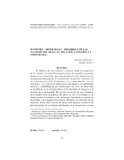| dc.rights.license | http://creativecommons.org/licenses/by-nc-sa/3.0/ve/ | |
| dc.contributor.author | Gillezeau B., Patricia | |
| dc.contributor.author | Ávila, Nelson | |
| dc.date.accessioned | 2011-05-30T21:28:03Z | |
| dc.date.available | 2011-05-30T21:28:03Z | |
| dc.date.issued | 2010-12-31 | |
| dc.identifier.issn | 13167790 | |
| dc.identifier.uri | http://www.saber.ula.ve/handle/123456789/33208 | |
| dc.description.abstract | El Objetivo de este artículo es mostrar, desde la perspectiva
de los autores, la relación categórica entre las variables economíademocracia
y desarrollo, bajo una perspectiva más humanista. La
metodología utilizada fue la construcción secuencial – histórico de
los pensamientos más resaltantes y la comprobación con las
realidades. La crisis de la democracia está ligada a la legitimidad,
eficacia y credibilidad de sus instituciones. La crisis del desarrollo
se manifiesta en la incapacidad a nivel mundial de integrar a la
mayoría de la humanidad. Más de dos tercios de los seres humanos
en el mundo viven en pobreza. En efecto se vive en el mundo en un
mismo tiempo cronológico, con distancias milenarias en niveles de
desarrollo y de organización política. Mientras las minorías de las
naciones tienen altos niveles de desarrollo humano producto del
funcionamiento de un Estado distribuidor, la gran mayoría coexiste
a niveles de supervivencia mínima y con instituciones débiles. Existe
en consecuencia una especie de principio de reciprocidad entre
democracia y desarrollo. La democracia debería inducir al
desarrollo y este a la democracia. Proceder de otra forma sería
involucionar de otra forma. | es_VE |
| dc.language.iso | es | es_VE |
| dc.publisher | SABER ULA | es_VE |
| dc.rights | info:eu-repo/semantics/openAccess | |
| dc.subject | Desafíos | es_VE |
| dc.subject | Economía | es_VE |
| dc.subject | Democracia | es_VE |
| dc.subject | Desarrollo | es_VE |
| dc.subject | Cambio | es_VE |
| dc.title | Economía - democracia - desarrollo de las naciones del siglo XXI. Relación categórica e inseparable | es_VE |
| dc.title.alternative | Economic – democracy development of the nations of the XXI century. A chategory and unbreakable relations hip | es_VE |
| dc.type | info:eu-repo/semantics/article | |
| dc.description.abstract1 | The aim of this paper is to show, from the perspective of the
authors, the relationship between the variables economic-democracy
and development in a more humanistic approach. The methodology
used was the sequential-historical construction of the most salient
thoughts and checking those with realities, the crisis of democracy
is linked to legitimacy, effectiveness and credibility of its institutions,
the crisis of development is manifested in the inability to integrate,
worldwide, most of the humanity. More than two-thirds of the human
beings in the world live in poverty. In fact, we live in a word with
the same chronological time, but with ancient distance levels of
developmcut and political organization, while a small group of
nations have high levels of human development from the operation
of a distributor state, the vast majority coexist with minimal survival
levels and weak institutions. Consequently, there is a kind of
reciprocity between democracy and development. Democracy should
lead to development and this to democracy. Proceed otherwise
should mean regress. | es_VE |
| dc.description.colacion | 17-56 | es_VE |
| dc.description.email | patig2000@hotmail.com | es_VE |
| dc.description.frecuencia | Semestral | |
| dc.identifier.depositolegal | 199802ME291 | |
| dc.publisher.pais | Venezuela | es_VE |
| dc.subject.facultad | Núcleo Rafael Rangel (NURR) | es_VE |
| dc.subject.keywords | Challenges | es_VE |
| dc.subject.keywords | Economic | es_VE |
| dc.subject.keywords | Democracy | es_VE |
| dc.subject.keywords | Development | es_VE |
| dc.subject.keywords | Change | es_VE |
| dc.subject.publicacionelectronica | Agora Trujillo | |
| dc.subject.seccion | Agora Trujillo: Economía | es_VE |
| dc.subject.tipo | Revistas | es_VE |
| dc.type.media | Texto | es_VE |


